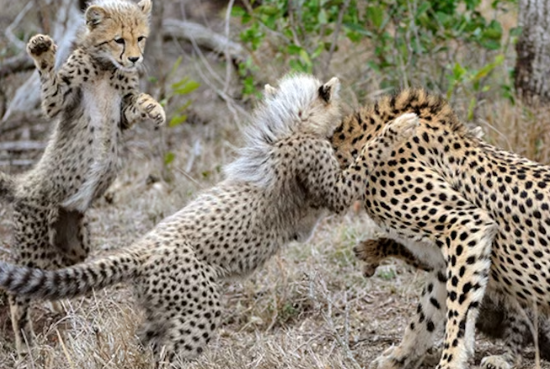
The circle of life is evident everywhere you go on an African safari.
It can be as mundane as a beetle working a pile of elephant dung or as spectacular as vultures and hyenas fighting over a carcass. Most dramatic of all: a predator stalking its prey and ultimately making a kill.
As each scene plays out, we spectators are treated to a never-ending improv that is, at its essence, a fight for survival.

Of course, part of Africa’s allure is the promise of being able to watch the natural order unfold in front of you, in real time. Good guides are careful not to disrupt that order, despite tremendous pressure to optimize the experience of their guests.
Having been on safari on the continent several times, my wife Karen and I know we are a bit spoiled. We have spent quality time with troops of mountain gorillas and big cats, and seen thousands of zebra and wildebeest take part in the Great Migration.
We have also been fortunate to spend time in the bush with seasoned guides who are able to identify hundreds of birds by a small snippet of song, follow the sound of a lion in the dark for miles to track its location, and discern whether (and when!) a footprint was made by a white or black rhino.
On a recent trip to the Phinda Game Reserve in South Africa, our guides wouldn’t even consider driving through land that was recovering from a recent fire; they were intent on making sure that this delicate ecosystem was protected in order to regenerate life.
As a visitor, it can be frustrating to see a pride of lions off in the distance and inaccessible, but this is the only way we can ensure the long term survival of these spectacular lands.

In the course of our travels, my wife and I are always intrigued when our guides relay stories of safari-goers who pressure them to disrupt the natural order in an effort to get the experience they believe they are entitled to simply because they’ve traveled all the way around the world.
In Phinda, one of our guides told us about a particularly memorable encounter with a family who was inconsolable because he failed to intervene in order to prevent a leopard from stalking and killing a female cheetah resting after a chase.
Animals in the wild often stir up strong emotions, and though it can be easy to attribute distinct personality traits to them, we must accept that these great predators are living as they were born to, competing for territory and food–which means that they are just as susceptible to peril as their prey.
During the course of our trip, we were lucky enough to encounter a mother cheetah and her tribe of months-old cubs. While the mother rested, her cubs never stopped moving–pouncing, climbing trees, and playing with unbounded energy. Later that day, we came upon the same family, only this time they were on the move and on the hunt. We watched as the mother slowly stalked through the bush, her cubs trailing behind. After an hour, it became clear to everyone in our vehicle that the small troop was headed toward a pride of sleeping lions.
We now found ourselves in an animated philosophical discussion with our guides. What harm could really be done by diverting the cheetah family away from the pride? Wouldn’t “saving” some of the world’s most endangered cats justify disrupting the natural order? Deep inside, we knew the answer. But watching these magnificent animals for several hours had touched our hearts and affected our thinking. Our connection to them was so strong that everyone in the vehicle agreed that we would have to leave if a conflict became inevitable.
The cheetah family was within 50 yards of the pride when the mother–whether from instinct, experience, or pure luck–turned tail in the opposite direction. Within a half hour, she had made a kill of her own. As we watched her cubs feed, the irony of the events was not lost on us. There are always going to be winners and losers in the bush. Despite the odds, this family lived to see another day.

One of the greatest joys of being on a guided safari is seeing a guide get excited about an animal encounter. Anything that wows these veterans of the bush is a sure sign that you are in the presence of something truly unique.
Once, on an early morning game drive in Phinda, we happened upon a large male lion. While we were quietly watching him, the massive cat stood up suddenly and began to roar. Usually, this call is a means of communicating with the rest of the pride–and to experience it in the wild was truly spectacular. While we didn’t hear any answers to his call, the deep and ferocious roars continued as we sat in our vehicle just feet away.
The excitement intensified when our guide received word that another male lion from the north had heard “our” lion’s calls and was headed our way. As it turned out, the two were brothers who had taken up with different prides in adjoining territories. None of the guides had seen them together for years and we were all poised to witness an unusual family reunion with very uncertain consequences. We could hear the excitement in our guides’ voices as they talked about lion behavior and the family history of these prides.
Soon, we saw the other lion making his way down a hill in our direction. We positioned our vehicle for the best photo opportunities, not knowing what to expect. Everyone expected claws, jaws, dust, and fury, as each lion was sure to protect his territory and demonstrate his dominance.
The tension was palpable as the two brothers came within ten feet of each other. And then–to everyone’s shock–they each threw themselves to the ground on their backs and rolled around in the dirt. It was fascinating, beautiful, and truly once-in-a-lifetime scene.
We had all experienced something amazing. It just goes to show that you can never predict what’s in store when you’re out on safari.
Andy Coleman is vice president of Digital at National Geographic Travel and an avid photographer with a special passion for wildlife. See more of the world through his lens on Instagram @awc007.










